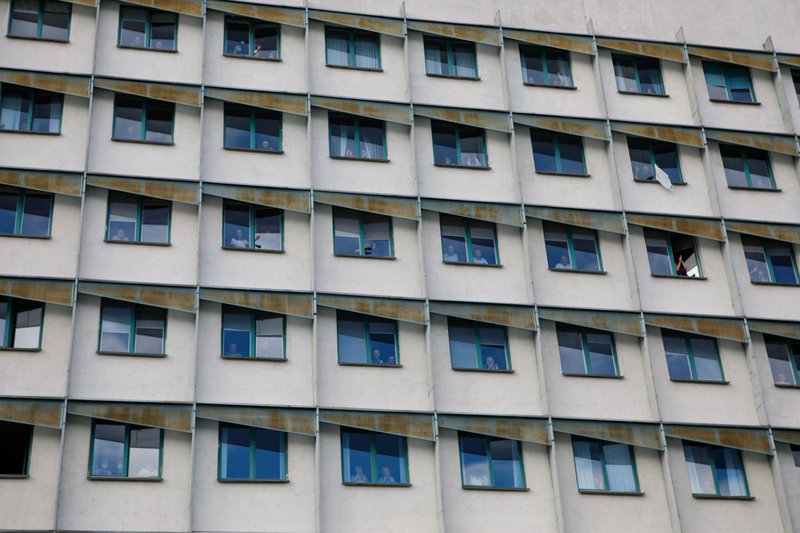A Brief Colonial History Of Ceylon(SriLanka)
Sri Lanka: One Island Two Nations
A Brief Colonial History Of Ceylon(SriLanka)
Sri Lanka: One Island Two Nations
(Full Story)
Search This Blog
Back to 500BC.
==========================
Thiranjala Weerasinghe sj.- One Island Two Nations
?????????????????????????????????????????????????Wednesday, September 9, 2020
‘The surgeons were nearly in tears’: Belarusian medics witness the brutal response to protests
Belarus’ healthcare workers have shot to the fore of the current protests - helping people injured by police and demonstrating themselves.
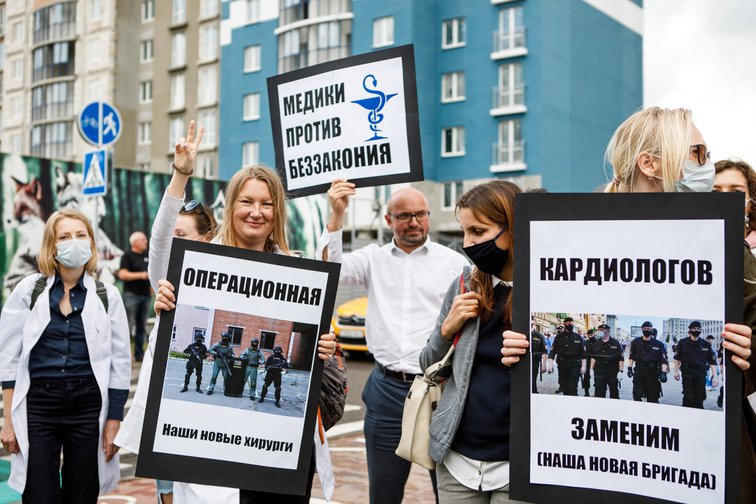 |
Медицинские работники участвуют в акции протеста, 27 августа 2020 г.Source: Darya Sapranetskaya
Darya Sapranetskaya-7 September 2020
Over the past month, doctors, nurses and ambulance workers in white coats and uniforms have often joined the protests in Belarus.
The authorities’ indifference to the coronavirus pandemic, systemic problems in the country’s healthcare system and the mass beatings of citizens and detention of healthcare workers during the protests have driven them to take a stand, despite the risks. Some have treated shocking injuries after cruel treatment and torture by police, particularly at Minsk’s Okrestina jail.
openDemocracy spoke to four Belarusian medics about their interactions with riot police, why their “chains of solidarity” actions are so popular, and the injuries that protesters are facing.
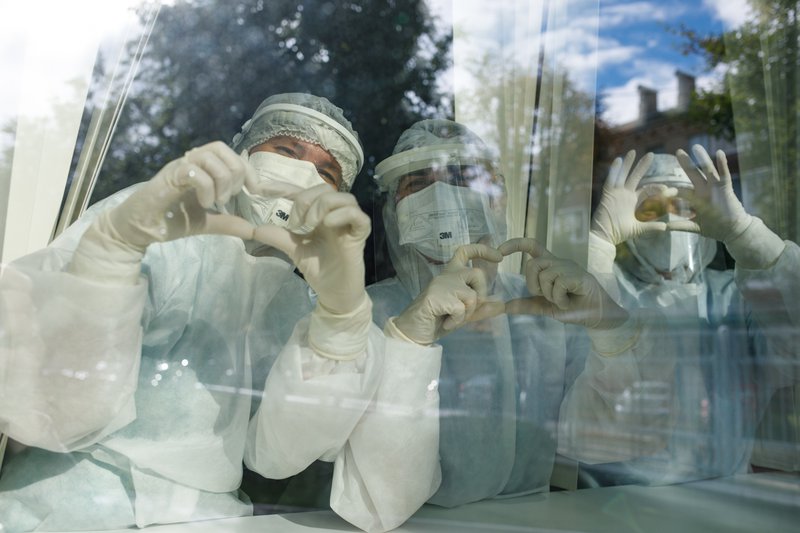 |
Sergey, paramedic
In my 20 years in the emergency services, I’ve never regretted that I went into medicine.
I always found it insulting that our work isn’t valued enough - whether by society or the state. It’s stupid to continue pretending that our healthcare system is free to use. There’s an unspoken social contract at play in Belarus: the country doesn’t pay its medics, and the doctor makes up his wages with envelopes of cash from patients. In practice, if they don’t pay officially, everyone still knows where they need to take the money. The ambulance service doesn’t do this. What could I take from someone? From a homeless person on the street or an alcoholic who’s been beaten up? If you’ve entered medicine, if you’ve taken up this cause, then you need to do it as best you can, that’s the end of it.
In March-April we knew that all the temperatures we were seeing are most likely COVID-19. But if a patient didn’t say that they suspected they had coronavirus, then the managers tried to send us on those call-outs in normal masks. There were times when we had to deal with infected persons without anything at all. There’s a call-out for someone with high blood pressure, but it’s COVID. A lot of colleagues have had it. One of my friends had a really bad case, he didn’t have to have a ventilator, but at one point he was really scared for his life.
“A doctor will always understand another doctor, but a civil servant with a medical degree can’t”
I remember that volunteers would bring us lunch from time to time, they wanted to do it on a permanent basis, but our manager refused it. For a time, McDonald’s would feed all the ambulance teams for free, but then we were banned from going there.
When you work with COVID patients, there’s a feeling that no one apart from you knows anything about it. When the volunteers and business representatives tried to do something for us, we felt as if we weren’t alone. There’s us, the medics, and then there’s everyone else. We felt as if we were fighting this war alone, and the city just continued living its own life. I still wear a mask on the bus and feel like a complete idiot, I’m the only one wearing one.
How should the Ministry of Health treat us? The C-grade students who have never had to deal with real patients? A doctor will always understand another doctor, but a civil servant with a medical degree can’t. The acting Minister of Health Dmitry Pinevich has four years of medical service, the rest of the time he’s spent working as a public official. How can he understand us? Practical medicine and the Ministry of Health are like a railway line: the rails are close, but they don’t meet. They’re in their world, we’re in ours. And that’s the reason for the 26 years of negative personnel choices. Good medics can’t stand more than a year or two and then leave for jobs elsewhere. There’s a saying in our profession: if you can’t treat patients, then go and teach how to treat them.
Personally, I didn’t expect to see this level of solidarity among the medical profession - that people would come out to protest. But during the events of 10-11 August when our valiant execution squads - I don’t know what else to call them - started detaining volunteer medics wearing their white coats on the streets, they crossed a red line. Quite a lot of doctors were detained at Okrestina [a temporary detention centre in Minsk where protesters and other detainees were tortured after the presidential elections].
In any war there’s an unspoken rule that you don’t target medics. And here they were beaten precisely because of their profession. Can I treat the riot police neutrally after that, give them medical care? I don’t know, it’s hard to answer. The fact that security forces used ambulances to detain people, well, that’s considered a war crime in the rest of the world.
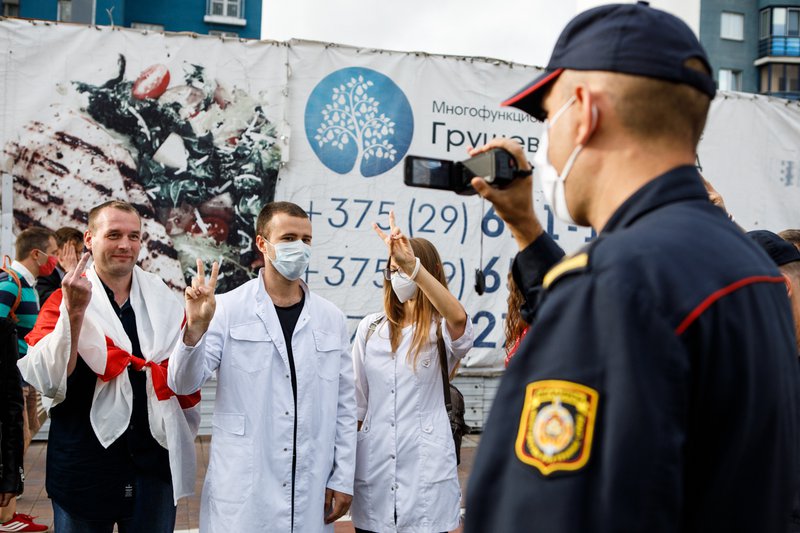 |
There was an in-house doctor at Okrestina, he used to be a paramedic at ambulance substation no. 9 in Minsk, I know his full name. Perhaps people lose their professional training in those places. I don’t know how to explain how he could fail to react to the injuries of many detainees. I can’t even find polite words to describe this, you can’t call him a human. When we took patients into hospital, the paramedics and doctors were literally shaking. They triaged people from Okrestina: who had to go straight to the ICU, who had to go straight to surgery, as if it was war time. Surgeons with many years of experience, who had seen their fair share in emergency rooms, were nearly in tears from what the ambulances were bringing in.
I try not to identify my profession and go to the protests just like everyone else. It’s not a question of going or not going. It’s scary to go, but it’s shameful not to - what can we do? When I go to a protest, I take my medical bag with me. Because if someone needs medical help, then the ambulance will have to get through the crowd. I’m pessimistic on the whole, every time I go I’m ready to see gunfire, I’m prepared to work serious injuries. I’m prepared for real things. Drawing out the situation will sooner or later lead to an ugly result.
Svetlana, therapist at a district clinic
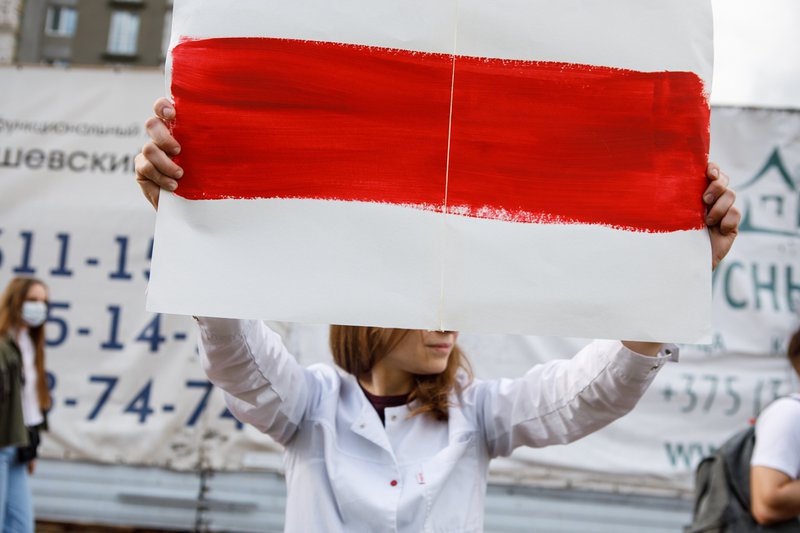 |
When I was a kid, I was always winding up at the hospital with injuries, and I liked it there. My relatives never went to doctors for help, and I decided that I was going to save everyone, like Dr House [from the TV series]. I passed my exams and got a free place at the Belarusian State Medical University. Back then, I only saw medicine’s positive sides and didn’t think about the wages. My mother joked that if I became a doctor, she’d have to help me her whole life.
When I was at university, a couple of times I began to think that I’d made the wrong choice. I couldn’t learn something, I wasn’t ready for the sheer amount of information I had to take in. But then I worked on my studies and realised that medicine is interesting. We had classes in hospitals, we could observe operations, touch the equipment. At university we were told that doctors are society’s elite, that was the ideology. But after, when I went for training, I couldn’t believe what I saw.
On one of my first call-outs, the patient threatened to set his dog on me if I didn’t take my shoes off. There was a patient going through drug withdrawal, who told me that he’d spent 15 years in prison for rape - and if I don’t send him to the hospital straight away, then I wouldn’t leave his apartment. After that incident I got a therapist. It’s very expensive, and my mother pays for it. She doesn’t know all the horrendous stuff that happens to me at work. People don’t see me as a doctor. They think that to get what they want, they have to shout at me. I’m not asking for some kind of special attitude towards me, but after the pressure and threats by patients, you get a thick skin, an armour. When someone’s rude to you, you’re rude back. To be honest, I didn’t think it would be like this. I thought if you’re a doctor, then people respect you.
“I was out the whole day in protective gear in 30 degree heat, covered in sweat, I had hypoxia, loss of concentration, and got tired very quickly. My weight went down to 49 kilos. I was thinking about trying to get coronavirus just to have a rest”
Seeing as I’ve worked with COVID patients, my wages have gone from 700-800 roubles ($300) to 1,000 ($380). That also factors in that I’m responsible for a neighbourhood, and I have a second set of responsibilities there. It was summer, everyone was on holiday, and when many healthcare workers were off sick for three or four weeks, then on a single day at the weekend I would have 55 call-outs, I was driving out to them until 11 at night, people had stopped waiting for me. I would only come home to sleep. I was out the whole day in protective gear in 30 degree heat, covered in sweat, I had hypoxia, loss of concentration, and got tired very quickly. My weight went down to 49 kilos. I was thinking about trying to get coronavirus just to have a rest. When I received my extra wages, I remember I cried so hard. I didn’t even want to spend them. And when all of this passed, I was even happy that I’d worked so hard, it was a valuable experience.
For a couple of years I’ve been planning to leave the country, to make more money and have a chance at a normal life. I have a cut-off point at 29, I need to do it by then. A bunch of my coursemates from university have already gone, Germany is taking specialists without requalification. You just need to confirm your language levels and pass the medical exams. So apart from my therapy I’m also paying for German lessons. I’m 27, my mother buys my clothes and shoes for me, I live at my boyfriend’s apartment. If I had to pay for everything myself, I wouldn’t be able to survive.
I think that if medics have come out to protest, then it’s the last straw. People’s patience has been stretched, but it’s mostly young doctors who are protesting, they’re ambitious, and not the 50- and 60 year-olds, who are used to keeping quiet. At a protest outside the state medical university, a coursemate of mine was arrested and beaten, he works in intensive care. In the end he ended up as a patient in his own ICU. This outraged his colleagues, but they can’t say anything openly in their position.
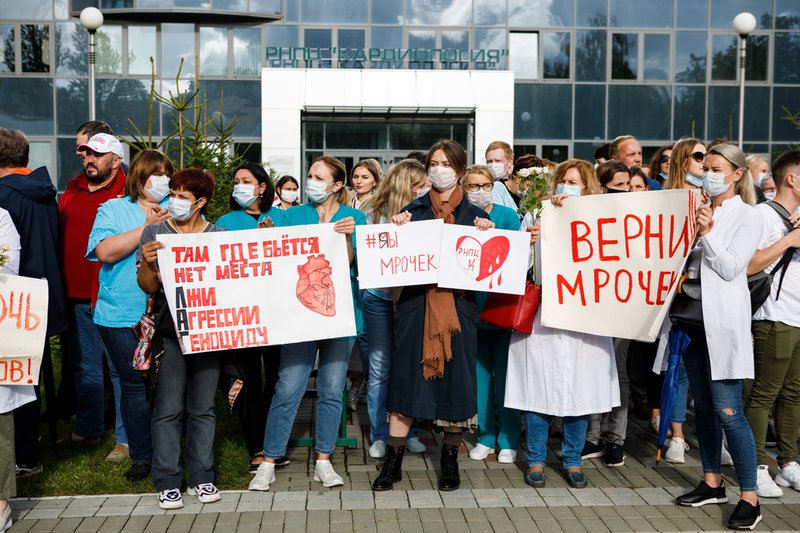 |
Our head doctor forced one nurse to write an explanatory letter about her actions - she walked past the doctors’ protest by chance, she wasn’t wearing a medical gown. Today I was going to do some jobs, I just live near Hopistal No. 4. But I saw the column of people marching, got my medical gown from the car and joined them. It was spontaneous, I just decided that if doctors are protesting, then I have to join them.
I think this will all end well, after a month or two. I hope there’ll be changes to the Ministry of Health, too. Moving to another country is cool, of course. But it’ll be hard to start everything from scratch there. My parents and all my relatives live here, if everything is sorted out, I don’t want to leave them.
Kristina, surgeon in Klumov clinical hospital, Minsk
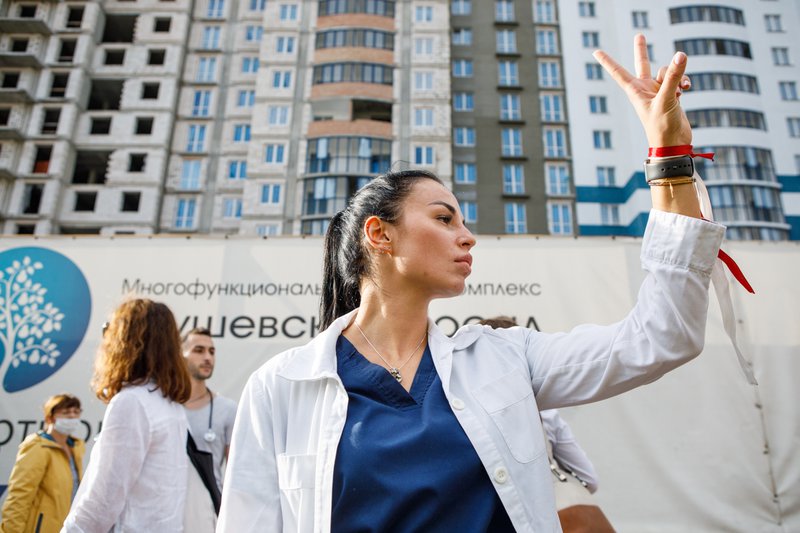 |
I always knew that my place was in surgery and I’ve never been disappointed in my profession. The system breaks a lot of people, who are, at first glance, strong. It’s not only young people who become disaffected, but people with experience, too. You want a doctor to have authority, but in the majority of cases our patients don’t respect us and don’t value our expertise. For us to give qualified care, we study constantly and don’t see our families. And people treat us as if we were cleaners. I don’t want to offend people who clean streets but these are different levels of responsibility. We are responsible for people’s lives. To conduct an operation is an emotionally difficult thing to do; if you make a mistake, then you have to live with it, and answer to someone’s relatives. You are obliged to do your work well, you don’t have any other choice.
I don’t think it’s a secret for anyone that the true number of cases of coronavirus infection and death has been hidden in our country. Everyday doctors like us aren’t free to do as we like, we do what management tells us. In our hospital, we weren’t forbidden from written COVID-19 as a diagnosis, but the statistics for the country as a whole are completely wrong: there were many more people who got it. The fact that our authorities refused to treat COVID as a disease and didn’t introduce quarantine measures naturally led to a rise in infection rates among normal people and medics. Since the start of July our surgeons have been back at work, but the infection hasn’t gone anywhere.
Naturally, public sector workers have been under pressure. We have a contract system, our wages aren’t so big and we have families who we need to feed. There’s no private medicine here, and many specialist doctors can’t find jobs. We spent a lot of time and energy to master this profession, so we have something to lose.
From the start, a large number of doctors came out to protest due to the violence. As doctors, we saw the traumas caused by law enforcement against peaceful people, many of whom had just left to go to the shops. We realised that anyone could wind up in their place. I think that it’s important for people to see this support from public sector workers. Medics at our hospital started coming out and organising “solidarity chains”. We did it during our time off, and management didn’t stop us. There’s always been a unity among medics, and with the current situation in the country, it’s become even stronger. Can my doctor’s gown keep me safe? I don’t think so. As practice has shown, those who do these kind of terrible things to peaceful people don’t have any moral principles.
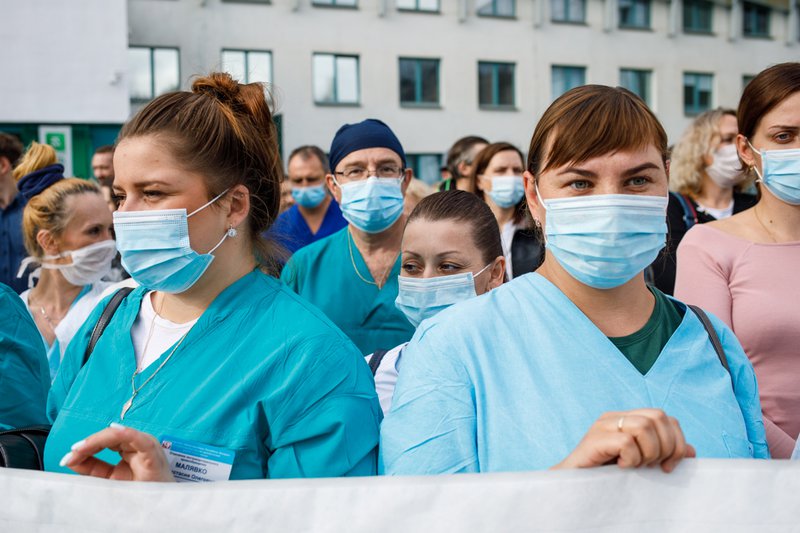 |
When I went out to help injured people on 10 August with my colleagues, it was scary. At first it seemed unreal that they could detain a doctor who just wanted to help. I had colleagues who told police officers that they had just come to treat people and were not participating in anything. Ten minutes later, the riot police turned up and took them to Okrestina. At the time, no one knew what awful things were being done there. We hadn’t yet realised that there are people - our citizens - who could use physical force so cruelly to another human. It’s not important what that person has done, there’s a constitution and the laws of the Republic of Belarus, which issue a certain punishment for a certain crime. What happened there was violence and torture.
I did my residency abroad, I have something to compare our healthcare system to. To be honest, I can’t say right now that I want to stay and work here as a doctor. It’s not even a case of opportunities for professional growth, I’m just not sure of how safe it is. With my civic position I can end up in prison. I can suffer just because I went out to support people who have been illegally detained. I won’t give in until the end, but I’m no longer sure that I want to work as a doctor in this country, in this situation we have here and now. I’m hopeful that everything will change, that’s why I’m expressing my position, and not hiding my face or my identity. I think that if I have an opinion, then I have the right to express it and shouldn’t be punished for it.
Anton, anaesthetist at the Republican Cardiology Scientific and Practical Center
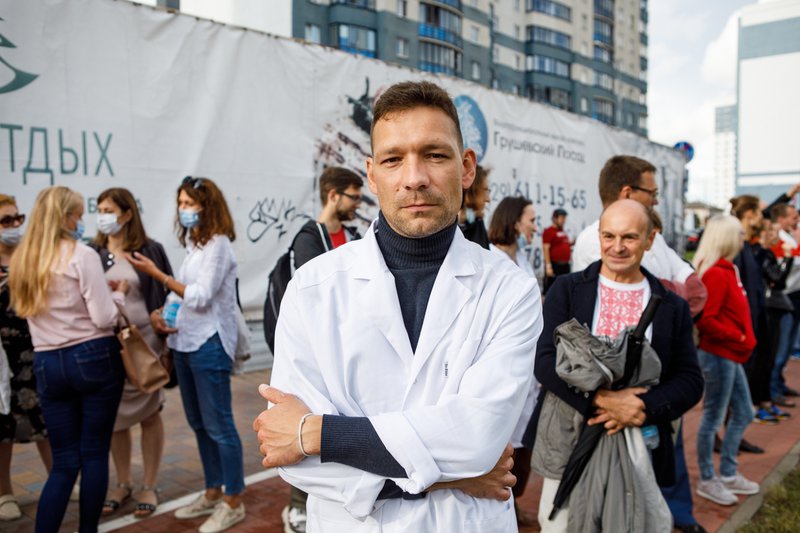 |
The solidarity chains are part of the general protest. It’d be strange if medics didn’t take part. When people started getting detained, medics were probably the first to step up for their own. For everyone this level of mass protest is happening for the first time. Medics are against violence by their professional background, we have a humane attitude to people, we’re intelligentsia. We save people, and others torture them - it goes without saying that medics will be against torture.
Everyone else didn’t take particularly part in protests previously. And then people came out in the hundreds of thousands. Everyone’s had enough, including medics. I went to the “Every day” demonstration [these rallies at Independence Square in Minsk are held every evening] and one evening I was detained there. I was worried, but I wasn’t afraid. I’m only afraid for my children, who weren’t with me. My cellmates asked me about my job, and when I answered that I’m at the Republican Cardiology centre, it made an impression on them, as well as the riot police.
I spent a night at Okrestina, and when my name was called in the morning, I was taken into the deputy commander’s office. He asked me to call my manager and tell him where he could pick me up. The remaining people detained had to wait another day for court. I was released without any papers. I know this happened because I’m a doctor.
While I was waiting for my manager, the deputy police commander told me his position - how he’d seen messages on detainees’ phones that they were being paid to come out onto the streets; that there aren’t that many people unhappy with the government, that we had been zombified and were being directed, that we didn’t know what we were doing.
It’s just my feeling, but in that office I felt like I was in control of the situation - it was the deputy commander who had to justify himself to me, not the other way round. The mass nature of the protests, the fact that they are continuing, means that the police will also start looking at the protesters differently. In the first days, the police probably felt that they had a strong regime behind them, and now they’ve started apologising. But this is only my impression. I sat in that police office as a free person, with my legs crossed, and didn’t feel as if I had been detained.
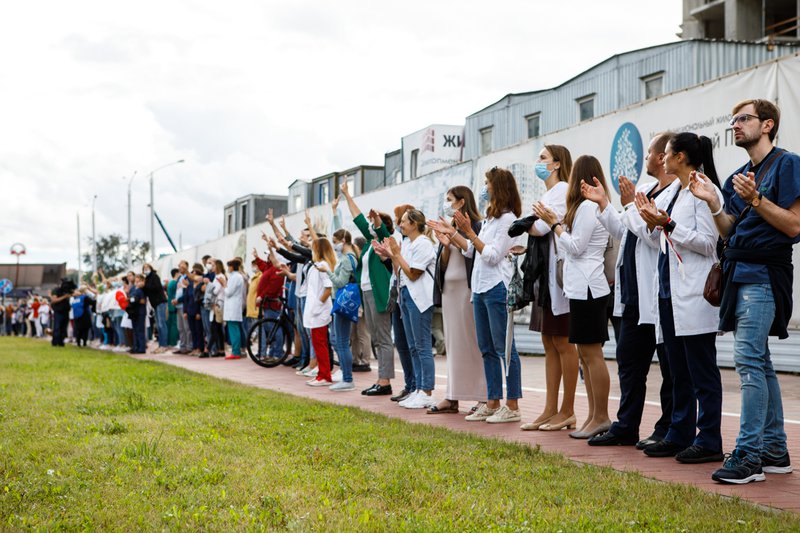 |
I was worried that I’d be fired, but it’s not such a big problem - I can find a new job in another hospital. I don’t think I’ll be blacklisted. I’m a highly qualified specialist, and anaesthetists are in demand.
I always followed what was happening in the country, and now I think that we’ll win. It’s a nice feeling. I want to live in a free, democratic state that abides by the rule of law. Now I’m sure that this isn’t in the distant future, that it’s tomorrow, rather than the day after. Our country exists not because we have a regime, but because we all work. And we won’t lose anything with the change of power, respecting human rights can only increase the development of civil society and responsibility. The regime might have detained a few of us, but it will all work out.
